- Home
- David Pilling
Caesar's Sword (I): The Red Death Page 12
Caesar's Sword (I): The Red Death Read online
Page 12
In this he was wise, for his little army was in a shocking condition. The hardships of the voyage had combined with a growing terror of the Vandals to reduce many of the soldiers to a pitiful state. Even the warlike spirit of the Heruli was all but extinguished, and I overhead many an alarming conversation between my comrades.
“If we are attacked by the Vandal fleet, then we must take to flight,” I remember one saying to his friends, “the Vandals are the best sailors and sea-fighters in the world, and I lack the strength to stand, let alone fight.”
This met with a general murmur of agreement from the pale, washed-out men around him. “Even if we make to land, what then?” croaked another, “a long march in the desert, with no cover, and two or three Vandal armies to fight at the end of it.”
“There are more of them than us,” added a third man, “besides, they will be well rested and fed, and fighting on their own territory.”
I heard a great deal more in this gloomy vein while the fleet dithered at Sicily. Belisarius resorted to sending out a spy, in the person of his secretary Procopius, to gather intelligence on the whereabouts of the Vandals. Procopius, an eager and dauntless young man who hero-worshipped the general, returned a few days later with reliable information that Gelimer had left Carthage to spend the summer at his inland palace at Hermione. The Vandal king, it seemed, was unaware that the Roman fleet had sailed, and there was nothing to stop us from landing and marching on his capital.
Belisarius was not the sort to ignore such an advantage. On receiving the news he immediately put to sea again. A Heaven-sent wind blew the fleet to Malta, and hence to within sight of the African coast.
The fleet drew near to the shore of Caput Vada, a narrow spit of land that projected a long distance from the mainland out to sea. Belisarius held a council of war on his galley to decide whether a landing should be attempted here. I know little of what passed between him and his officers, save that Belisarius prevailed against the general opinion, and gave orders for the army to land that same day.
Three months had passed since we departed Constantinople. I was lifted onto a boat, and then obliged to wade ashore on legs that shook under me like those of a new-born calf. The African sun beat down mercilessly as I tripped and stumbled through the warm water, using my spear as a crutch.
Fifteen thousand soldiers and six thousand horses, along with their arms, war engines, stores, water and equipment, made an appalling mess of the previously spotless African beach. The landing was chaos. All discipline and order were forgotten as this host of sick, frightened and exhausted men and beasts struggled to shore. If the Vandals had attacked then, they would have straightaway tossed us back into the sea. Fortunately, Gelimer and his army were a long distance away and blissfully unaware of what had just crawled onto their coast.
Belisarius knew how vulnerable his army was. He and a group of officers galloped away in search of a suitable place to build a fortified camp. They soon returned, heralded by a cloud of dust, and to groans and curses from the men gave orders for work to begin on a ditch and rampart, about half a mile inland.
Several hundred reluctant infantry were detailed for the task and marched away with a troop of Hunnish cavalry for an escort. Wary of attack from sea, Belisarius also ordered the fleet to re-form into a semicircle with a guard of five archers stationed aboard each ship.
Meanwhile I lay on the warm golden sand, blinking up at deep blue skies and wondering how in God’s name I had come to be washed up here, at the furthest reaches of the earth.
I had not lingered long before I felt a boot nudge against my ribs.
“Get up, Coel,” rasped Pharas, the commander of the Heruli, “I saw you walk ashore, so you can walk to the camp. Shift, you lazy bastard.”
Pharas was a flat-faced, mean-eyed brute, and best obeyed. I picked up my spear and painfully struggled to my feet. My horse was among the beasts still being disembarked from the ships, so I joined one of the straggling columns of infantry making their way towards the camp.
Chapter 16
After just a day’s rest, Belisarius ordered the army to break camp and advance on Carthage, which lay some ten or twelve days’ march to the north. His advance guard seized the town of Syllectus, which was unguarded by walls and lay close to the sea on the road leading to Carthage. The citizens and country folk made no attempt at resisting our spearmen, and meekly gave up the keys of the town.
“God grant that all our conquests are so easy,” I overheard Pharas remark to one of his officers.
I was considered fit to ride, and so rejoined the Heruli. Belisarius decided to send three hundred foederati a few miles ahead of the main army as a vanguard, while double that number of Huns covered our left flank. The sea guarded our right, and the mass of infantry were left to struggle along in the rear. The general regarded speed as vital, and wanted to reach Carthage before Gelimer had to time to react.
He was careful to hug the coast as we marched north, and to stay in close contact with the fleet, which was commanded to keep the army in sight at all times. To that end the sailors used oars to match the pace of the army during calms and slight breezes, and the minimum of sail if a strong wind blew up.
My spirits began to recover, as well as my guts, helped by the lack of resistance the army met with on the march north. Those African locals we encountered showed no hostility, and were happy to sell us fresh fruit and other much-needed provisions. Belisarius ensured they were paid a fair price, and had a couple of Armenian soldiers who stole from an orchard flogged in sight of the whole army.
This was the signal for another of his impassioned public harangues, in which he warned his soldiers to learn from this example, and of the importance of making allies of the natives. Afterwards I heard the culprits complain bitterly of their harsh treatment while a surgeon rubbed liniment onto their bleeding backs.
“Be thankful,” the surgeon remarked, smiling nastily at their howls as he rubbed with unnecessary vigour, “in the old days of the legions you would have been executed for such a breach of discipline. Belisarius can be hard when necessary, but he is no Tiberius.”
The army marched at a rate of about twelve miles a day, which was slow going, but Belisarius was cautious and determined not to leave the infantry too far behind. Every night, unless we had reached a fortified settlement to take shelter inside, we built a camp defended by a ditch and a stockade.
So far the campaign had been more like a pleasure trip, and never more so than when we reached Grasse, just fifty miles from Carthage. Here the supposedly barbaric Vandals had built a country palace surrounded by exotic gardens, watered by a cunning irrigation system.
The garrison had abandoned the palace in the face of our advance, and it was like stumbling on a deserted Paradise in the middle of parched desert. Belisarius allowed his weary men a few hours to wander among the shady woods and groves, pick ripe fruit from the trees and drink crystal-clear water from sparkling fountains.
It was here that I first met Antonina, Belisarius’s wife, who had insisted on accompanying her husband on campaign. I had heard much about her during the voyage, mostly from sex-starved mariners and soldiers with a tendency to let their imaginations roam free. She was a former courtesan, like Theodora, and had also made her fortune by catching the eye of a great man. Antonia and the Empress were said to be great friends, and to indirectly rule the Empire through their husbands.
I had not forgotten Theodora’s parting threat. She meant to harm me, and I was fearful that Antonina would be her instrument. The lady herself showed no interest in me when I met her walking in the gardens, arm-in-arm with Belisarius. I noticed that he hung on her every word, laughed when she laughed, and gazed on her with slavish adoration.
In person she was tall, willowy and fair-haired, with an athletic gracefulness that reminded me painfully of Elene. Her beauty was of a more natural sort than Theodora’s, and not so reliant on paint and cosmetics to sustain it. She was dressed like a respectable Roman wife, in an ankle-length w
hite robe and a white head-cloth to protect her against the glare of the sun. Her modest clothing only served to make her more alluring, and drew attention to the superb body concealed underneath.
I stood to attention and saluted the general. He returned the salute in an offhand sort of way, and then stopped when he recognised me.
“Coel,” he said in a tone of pleasant surprise, “so you survived the voyage, then. I’m glad.”
“Thank you, sir,” I replied, impressed that he even remembered my name. The Emperor had given Belisarius supreme responsibility for the African campaign, a clever way of avoiding blame if it failed, and I suspect he hadn’t given me a second thought since leaving Constantinople.
“This is the Briton I told you about, my dear,” he said, turning to his wife, “do you remember? He was once a charioteer in the Circus. They called him Britannicus.”
At the mention of my Circus name I thought I detected a flash of recognition in Antonina’s lovely eyes, quickly masked.
“I remember,” she said in her soft, breathy voice, “a Briton. How singular. He doesn’t look very well.”
“No, he doesn’t,” Belisarius agreed, studying me with a look of genuine concern, “there is considerably less of you than when we last met, Coel. Are you ill?”
“Touch of sickness on the voyage, sir,” I replied, “turns out the sea doesn’t agree with me. On the mend now though.”
“Good. Make sure to build up your strength. You will need it.”
“To retrieve the sword, sir?”
Some of the warmth drained out of the general’s agreeable smile. “Indeed,” he said awkwardly, “though it will mean wresting the blade from Gelimer’s own hand.”
Antonina had listened to this exchange with interest. “What sword, husband?” she asked, “not Crocea Mors, surely? You led me to believe that King Gelimer was a liar, and that he didn’t really have it.”
Belisarius winced at the edge in her voice. “There may be something to Gelimer’s claims,” he admitted, giving me a dark look, “it was supposed to remain a secret.”
“Really? And why should General Belisarius confide a secret to one of his soldiers, but not his wife?”
There was real venom in her tone now. I could well believe that she and Theodora were friends. Belisarius’s mouth worked as he groped for a reply that might placate her.
“The sword is mine, my lady,” I ventured, “I inherited it from my father.”
Antonina looked at me in astonishment. Her agile mind quickly filled in the gaps. “Old Julius campaigned in Britain, didn’t he?” she said slowly, “and this Britannicus, or whatever his name is, comes from that island…”
She gave a little laugh. “Christ save us, you don’t mean to say the story is true? But how did Gelimer come to have the sword?”
“No time for that now,” Belisarius said firmly, “this is not something to be discussed in the open, where all might hear. God be with you, Coel.”
“Wait,” said Antonina as he tried to lead her away, “if this man does succeed in taking Caesar’s sword from Gelimer, does he get to keep it?”
“No,” Belisarius replied brusquely, “it is the property of Rome, and will be taken for safe keeping to Constantinople.”
“He will at least be compensated?” asked Antonina. She was enjoying herself immensely, dragging the truth from her husband and embarrassing him in front of one of his soldiers. Not for the first time, I gave thanks that I was a bachelor.
“Of course,” Belisarius said with a flicker of anger, “do you think I mean to rob him? In exchange for his birthright he will be offered an officer’s rank in the army, or money for his passage home to Britain. Or he can name his own price, within reason. Any man who plucks a sword from the hand of a Vandal king deserves to be rewarded. We have said far too much. Come.”
He took his wife’s arm again. This time Antonina made no objection as he half-dragged her away.
I was left to nurse bitter thoughts. To retrieve Caledwlch from the Vandals would be difficult enough. To have it taken from me again might be unbearable. I still frequently suffered from bad dreams, in which the giant figure I took to be my grandfather re-fought his battles and regarded me balefully from beyond the grave. His shade was watching me. Judging me.
Belisarius was a noble man, or so I hoped. If I did manage to win the sword, then perhaps he would let me retain it: after all, that would be some feat.
When the army was sufficiently rested, it marched away from the unexpected pleasures of Grasse and further along the coastal road that led eventually to Carthage. As we moved out, several of our scouting parties ran into groups of Vandal horsemen, and a few sharp skirmishes were fought before both sides retreated.
I saw the Roman survivors galloping to the head of the column to inform Belisarius, and soon the whole army knew that the enemy was near. Gelimer had finally received word of the invasion and sped from his palace at Hermione to defend Carthage, gathering up what troops he could on the way.
What followed, my first experience of battle, must count as one of the strangest and most confused affairs in the history of war.
Chapter 17
Shortly after leaving Grasse, our army was compelled to turn away from the coast and march inland, in the direction of Tunis. This meant we became separated from the fleet. Belisarius instructed the admiral to work his way around the mountains of Cape Bonn and maintain a distance of at least thirty miles between the fleet and Carthage, unless he received further news from the army.
We marched in the same order, with three hundred cavalry again acting as a vanguard and riding several miles ahead. The infantry were left behind in their entrenchments at Grasse, with orders to stay and guard the baggage. Belisarius also left behind his wife, though given the choice she would have donned a shield and helmet and ridden with him into battle. Whatever sins Theodora and Antonina stand accused of – and the list is inexhaustible – let no-one accuse them of lacking courage.
Like every other man in the main body of cavalry, I had no idea what was happening beyond my line of sight. We rode in column, some four thousand horsemen, through a wide, dusty plain that steadily narrowed to a rocky defile to the north, surrounded by a range of barren hills. The mountains blocked our view of the sea to the east, and another range of hills lay to the west.
The slopes of the defile were occupied by a village called Decimum, the name of which indicated the tenth milestone from Carthage. The milestone itself, a large stone pillar, lay on the outskirts of the village. It was here that Gelimer planned to fight. His plan was to divide his army into three parts in order encircle and entrap the Roman cavalry. It was a bold plan, original and brilliant in conception, and from the start it unravelled.
Belisarius allowed the vanguard to get too far ahead. They were led by his friend, John the Armenian, a capable officer, but fixated on plunder and far too inclined to take matters into his own hands. Fearful that John had committed some folly, Belisarius sent the foederati in search of the vanguard, while he followed with his bucelarii.
Unknown to us, the Huns on our left flank were already engaged with a much larger squadron of Vandals under the command of Gibamund, Gelimer’s nephew. The Vandals should have crushed our flank, but the ferocity of the Hunnish counter-charge took them by surprise. They were routed and pursued across a desolate plain known as the Field of Salt, where Gibamund and hundreds of his men were slaughtered.
Completely unaware that the battle had started, the foederati galloped merrily into the rugged hills that lay to the north. I rode among with them with a detachment of Heruli. There was no enemy in sight, and I had sunk into the delusion that warfare amounted to little more than splendid exercise in fresh air.
We reached a field between two hills, littered with the mangled bodies of men and horses. Pharas, whom Belisarius had placed in overall command of the foederati, ordered a halt to examine them. To our surprise and encouragement, we discovered just twelve dead Romans among scores of fal
len Vandals.
This was my first proper look at the enemy. I found that they much resembled the Heruli and other Germanic peoples. Slightly darker-skinned, perhaps, from living in the baking deserts of North Africa, but otherwise there was little to distinguish them.
Pharas was at a loss. “The vanguard must have fought here,” he said, scratching his beard, “but where the hell did they go?”
I pointed out that the trail of corpses led away to the north before petering out. “Perhaps they routed the Vandals and then rode after them in pursuit,” I suggested.
Pharas didn’t like taking advice from mere troopers, but nodded in agreement.
“That would be just like the Armenian,” he spat, “the selfish bastard will chase them all the way to Carthage. He’s a brigand, not a soldier.”
I heard shouts behind us, and twisted in the saddle to see a number of our soldiers galloping up from the rear.
“Sir!” one of them shouted at Pharas. “Look there!”
He pointed his spear to the south, back the way we had come. Pharas snapped at me to go and investigate, but there was no need. A rapidly growing cloud of dust became visible on the horizon, accompanied by the thunder of galloping hoofs and the shrill blast of trumpets.
“It’s Gelimer, sir!” another man yelled. “His whole army is coming up the road, straight at us!”
Pharas swore horribly. “Up there, lads,” he cried, pointing at the nearest hill, “we’ll make a stand at the top and hold them off until the general arrives.”
All our months of discipline and training melted away. Less than half of Pharas’s command followed him up that hill. The rest flung away their weapons and scattered in all directions.
Gelimer himself was indeed riding towards us at the head of seven thousand cavalry. Somehow he had bypassed Belisarius’s column, and now his entire host into a full-blooded charge against the foederati.
The Vandals came on at a furious gallop. Their forward line crashed into our flank as we were still struggling up the slope. I caught a brief glimpse of their horse-tail banners before I had to haul savagely on my reins and wheel my horse to avoid a couple of fleeing Heruli.

 The Growth Delusion
The Growth Delusion The Hooded Men
The Hooded Men Longsword
Longsword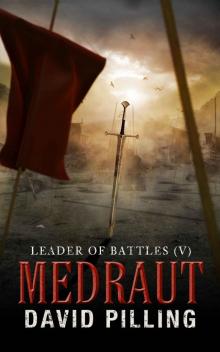 Medraut
Medraut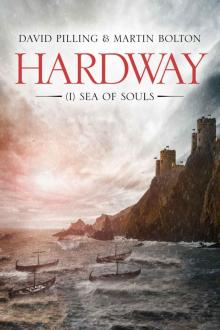 Hardway
Hardway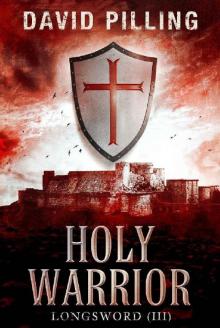 Holy Warrior
Holy Warrior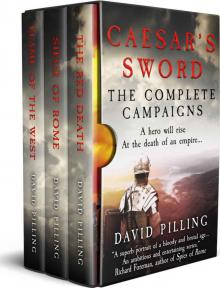 Caesar's Sword: The Complete Campaigns
Caesar's Sword: The Complete Campaigns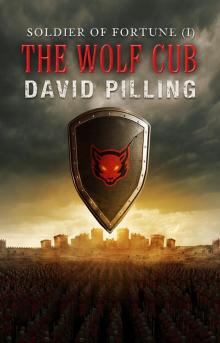 The Wolf Cub
The Wolf Cub Reiver
Reiver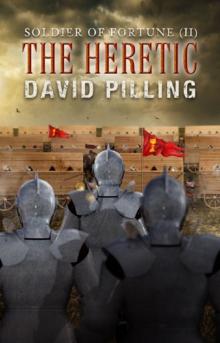 The Heretic
The Heretic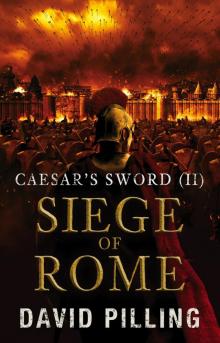 Siege of Rome
Siege of Rome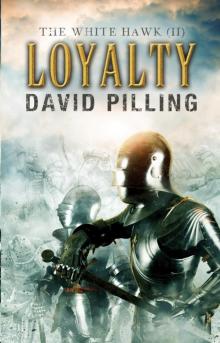 Loyalty
Loyalty The Path of Sorrow
The Path of Sorrow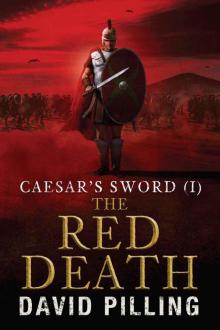 Caesar's Sword (I): The Red Death
Caesar's Sword (I): The Red Death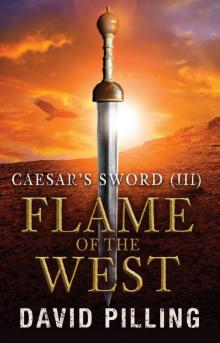 Flame of the West
Flame of the West The Best Weapon
The Best Weapon Sacrifice
Sacrifice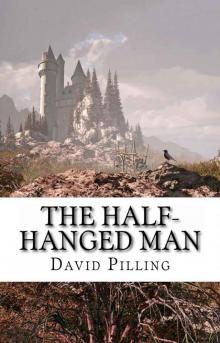 The Half-Hanged Man
The Half-Hanged Man